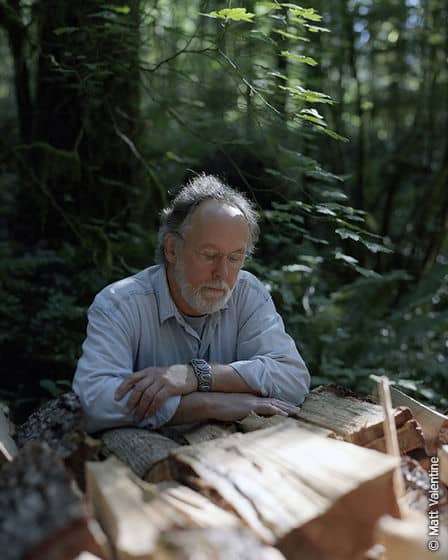Barry Lopez in Seattle tomorrow, KUOW interview at 9 am

We’re getting ready for Barry Lopez’s visit to Seattle and couldn’t be more excited. We’re meeting him tonight at a private reception near Seward Park, and then co-hosting his presentation “Speak, Landscape” at Benaroya Hall in downtown Seattle tomorrow night, April 7. Inbetween, Barry will be doing an interview on KUOW 90.3 FM with Steve Scheer at 9 am and visiting a creative writing class at Roosevelt High School with the Writers in the Schools program.
If you don’t already have your ticket, Seattle Arts & Lectures is offering a special deal on them to all “Fans” on North Cascades Institute’s Facebook page. Tickets are available online, by phone at (206) 621-2230 or at the Benaroya Hall box office beginning at 6pm. The Institute will be tabling our exhibit in the lobby, handing our information on 2010 Learning Center programs and selling the beautiful Barry Lopez poster we designed using Rebecca Allan’s fascinating tondo paintings — come by and say hello!
We’ll leave you with this introspective biographical essay Barry has posted to his website:
For most of my writing life I’ve been driven, like other writers and artists, to explore. The shape this took from the start was geographical, bibliographical, and conversational–I traveled widely, read voraciously, and sought out stimulating conversation. Central to the ideas I developed about what it means to be a writer was the need to remain conscious of the voices I encountered while traveling, reading, and conversing. The voices from two communities, in particular, held my attention: the circle of artists and writers with whom I felt the greatest creative camaraderie, and the group of people–family, friends, mentors, professional colleagues–to whom I felt most beholden. This latter group eventually came to include readers interested in the sorts of things I was trying to illuminate, people with whom I imagine I share a common fate.
A dangerous bit of American folklore is that our social, environmental, and political problems, which grow more ominous by the day, call for the healing touch of a genius. They do, but if we’re intent on waiting for some such remarkable individual to show up we can count on disappointment. The solution to what threatens us, however, is already here, in another form. It’s in our diverse communities. Most often we recognize the quality of genius in an individual man or woman; but the source of that genius lies with the complicated network of carefully tended relationships that sets a vibrant human community apart from a solely political community.
What this has meant for me as a writer, in the simplest terms, is that if you want to be of use in the world, it’s good to pay attention to what others already know.
If I were to offer any advice to young writers, it would be this: be discriminating and be discerning about the work you set for yourself. That done, be the untutored traveler, the eager reader, the enthusiastic listener. Put what you learn together carefully, and then write thoughtfully, with respect both for the reader and your sources.
In conversations over the years with other writers and artists, about what we’re actually supposed to be doing, I’ve been struck by how often, deep down, the talk becomes a quest for the same mysterious thing. Underneath the particular image in question, the particular short story or musical composition, we’re looking for a source of hope. When a conversation about each other’s work doesn’t pivot on professional jargon or drift toward the logistics of career management, when it’s instead deferential and accommodating, we’re sometimes able to locate a kind of rosetta stone, a key to living well with the vexing and intractable nature of human life. If any wisdom emerges in these conversations, it offers sudden clarification. It’s the Grail shimmer. You feel it, and you can’t wait to get to work.
It’s a cliché, certainly, to say an artist or a writer should lead a questing life. It’s less often acknowledged, however, that in pursuing such a quest, a person frequently leaves behind a trail of at least minor injustices. I believe an artist has to remind herself or himself, in other words, that when you write or paint or compose music, you draw in mysterious ways on the courtesy and genius of the community. It is this sensitivity to gifts welling up unbidden, this awareness of the fate of the community, no matter how ego-driven or self-absorbed a writer or artist might become, and no matter how singular the work, that divides art from commerce.
In traditional communities all over the world, this ethic of communal reciprocity, in my experience, is what separates acts of selfishness from the work of leadership. The role of the artist, in part, is to develop the conversations, the stories, the drawings, the films, the music–the expressions of awe and wonder and mystery–that remind us, especially in our worst times, of what is still possible, of what we haven’t yet imagined. And it is by looking to one another, by attending to the responsibilities of maintaining good relations in whatever we do, that communities turn a gathering darkness into light.

